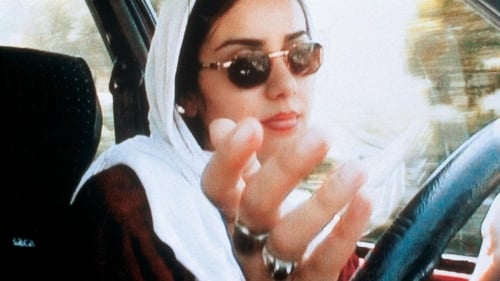
Director
Living in the confinement of a shared apartment with her controlling mother, Narges is soon confronted with the traumatic situation that women face under patriarchy. A sensitive, brave account about womanhood in modern-day Iran.

Director
An honest, fearless, and strong examination of the body and identity in relation to social taboos, violence, and power structure.

Director
A daughter pushes at the bounds of her relationship with her mother as she unpicks the psychological consequences of the violence she suffered.

Assistant Director
Mania Akbari’s From Tehran to London (2012), has a Russian-doll structure. It begins with Akbari shooting her latest film entitled Women Do Not Have Breasts about a couple, the young poet and writer Ava and her upper-class older husband Ashkan, who live in a large, beautiful – yet isolated – house in the hilly outskirts of the city. Household workers Maryam and Rahim attend to their needs. But despite their comfortable lives, Ava is increasingly dissatisfied and estranged in her relationship with Ashkan. What seems to have been an exciting relationship in the past is now little more than a series of mutual reproaches, as Ashkan incessantly tries to change Ava into someone she isn’t – a dutiful wife.

Executive In Charge Of Production
Mania Akbari’s From Tehran to London (2012), has a Russian-doll structure. It begins with Akbari shooting her latest film entitled Women Do Not Have Breasts about a couple, the young poet and writer Ava and her upper-class older husband Ashkan, who live in a large, beautiful – yet isolated – house in the hilly outskirts of the city. Household workers Maryam and Rahim attend to their needs. But despite their comfortable lives, Ava is increasingly dissatisfied and estranged in her relationship with Ashkan. What seems to have been an exciting relationship in the past is now little more than a series of mutual reproaches, as Ashkan incessantly tries to change Ava into someone she isn’t – a dutiful wife.

acteur
After casting painter and video artist Mania Akbari as the central figure of his groundbreaking Ten (2002), and then witnessing her outstanding debut as a feature film director in 20 Fingers (2004), Abbas Kiarostami urged her to direct a sequel to the film. In Dah be alaveh Chahar (10 + 4), though, circumstances are different: Mania is fighting cancer. She has undergone surgery; she has lost her hair following chemotherapy and no longer wears the compulsory headscarf; and sometimes she is too weak to drive. So the camera follows her to record conversations with friends and family in different spaces, from the gondola she had famously used in her first feature to a hospital bed.

Amin
디지털 영화 실습이라는 과목에서 교수님께서 이 키아로스타미라는 감독의 텐이라는 영화를 보여주셨었다. 이 영화를 보고 제일 놀랐던 점은 영화 속에서는 주인공들의 굉장히 사사로운 사생활을 다큐멘터리 같이 보여주고 있다. 운전하는 여자의 집안이야기, 이별한 여자의 슬픔 등 그런데 영화를 다 보고 나면, 나는 전혀 몰랐던 이란의 사회적 문제점도 알게되고 이란 사회의 어떤 흐름을 알게 었다. 영화 하나하나의 에피소드들은 굉장히 사적인 이야기를 담고 있는 데도 영화 전체를 보게 면은 사회적인 문제점이 보인다는 점에서 굉장히 충격적이었고 감독의 의도가 좋았던 영화였다.이 감독처럼 차에 카메라 두 대를 설치하고 똑같이 찍는 다고 해도 절대 이 텐처럼 영화가 나오기가 어려울것 같다. 다큐멘터리는 현실의 재생물이 아니라 우리가 이미 점하고 있는 세계의 재현이다. 다큐멘터리는 세계에 대한 특정 시각을 나타내는데, 그 안에서 재현되는 세계의 면면이 익숙하다 하더라도 그 시각은 처음 접하는 것일 수 있다. 나는 이 영화를 처음 접하고 이란 영화를 처음 접하는 것이었지만, 이 영화에서는 이미 차도르를 두르고 있는 한 여자를 주인공으로 설정함으로써 이 주인공이 아들과 대화할 때 이 여자는 지금 어떤 상황이고, 어떤 문제점을 가지고 있는지 알수 있게 된다. 또한 이 영화는 등장인물들의 사사로운 사생활을 보여주지만, 열가지의 이야기를 보고나면 이란 사회의 전체적인 흐름을 알 수 있는 영화이다. 여자는 운전을 계속하고 조수석에 앉은 사람들과 대화를 하는 내용이다. 대화의 주인공으로는 여자의 아들이 나오고 아들과 대화를 하는 부분이 영화의 대부분을 차지한다. 또 여자의 언니, 여자가 잘못 태운 창녀, 기도하러 가는 할머니, 이별한 여자가 등장한다.

Director
I Look Like My Mother follows Amina Maher’s courageous journey to free herself from the constraints of norms, taboos and traditions. Her coming-out as a trans woman is her rebellious stand against rape culture and patriarchy, and her strong support for a future beyond cis-normativity. Ten by Kiarostami recorded ten-year-old Amina sitting in the passenger seat of her mother’s car without her consent. Now, she has taken the wheel, driving her actress mother, Mania Akbari, through Berlin – in a new body and with a new name, Amina. On her journey, Amina navigates through highs and lows with humour and energy, looking to transform the overshadowing past in playful dream sequences and in honest discussions with her queer community. With sheer endless creative energy, she transforms her present and past experiences into beautiful elegies of a struggle for her own truth – in her own terms. There is nothing to stop Amina from putting her foot down on the accelerator now.







